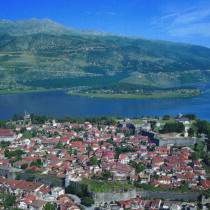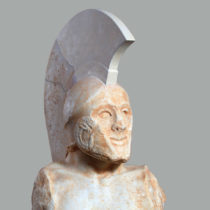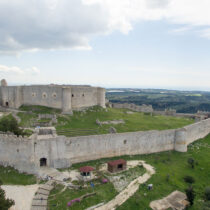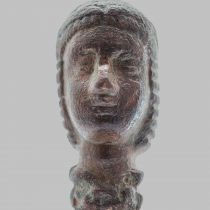Excavations in China yield large-scale subterranean dwellings
Archaeologists in southwest China have discovered large-scale ruins and various items and artefacts.
Paleogenomic analysis sheds light on Easter Island mysteries
Had inhabitants of Easter Island intermixed with South Americans prior to the arrival of Europeans on the island in 1722?
Viking Age script deciphered
What was previously thought to be typical Viking Age patterns in silver have now proven to be geometric Kufic characters.
New finds from the prehistoric settlement of Therasia
Results of this year's excavations on the Therasia island.
“Hiera Odos and Eleusis” in the Acropolis Museum
The Eleusinian Mysteries, the most important religious rites of ancient Greece, will be presented in the temporary exhibition titled “Hiera Odos and Eleusis”.
Scientists describe ‘enigmatic’ species that lived in Utah some 500 million years ago
Scientists named the newly described species Siphusauctum lloydguntheri.
New study suggests that last common ancestor of humans and apes was smaller than thought
Recent study suggests the common ancestor of apes was likely small, probably weighing about 12 pounds, which goes against previous suggestions of a chimpanzee-sized, chimpanzee-like ancestor.
Partial statues of King Psamtik I, Ramses II and Ra-Hor-Akhti discovered
Discoveries made by archaeologists working in Souq al-Kharnis in the Matariya district of Egypt.
Leonardo da Vinci’s Salvator Mundi to be auctioned by Christie’s
Leonardo da Vinci's work Salvator Mundi, unveiled in 2011 causing a worldwide sensation, will be auctioned at Christie's.
Scythians and early nomads from Siberia to the Black Sea
This conference draws together scholars of all ages and many nationalities to share the results of their research projects, latest archaeological discoveries and new scientific research.
Evolution: The beneficiaries of mass extinction
Mass extinctions were followed by periods of low diversity in which certain new species dominated wide regions of the supercontinent Pangaea, reports a new study.
Shiptime Maritime Archaeology Project, Orkney HMS Royal Oak Steam Pinnace Located
The location of this little ship was not known – until last month.
‘Fake fin’ discovery reveals new ichthyosaur species
An ichthyosaur first discovered in the 1970s but then dismissed and consigned to museum storerooms across the country has been re-examined and found to be a new species.
A Trojan Prince beyond the buzz
With the source's originality being questionable, the story says a lot about archaeological material management as well as heritage journalism.
The symbol of Palmyra “roars” again
The restored “Lion of Al Lat” is on display at the Damascus Museum where it will remain until returning one day to welcome visitors once again to the Palmyra Museum.
“On the move”: Temporary exhibitions of the Ministry of Culture and Sports
Why are temporary exhibitions organized in our museums and abroad? How do our antiquities travel? What terms are used by museums at an international level when loaning or acquiring works for temporary exhibitions?
U of T archaeologist goes underwater to study ancient trade routes in Cyprus
Fulton, an assistant professor of historical studies at U of T Mississauga, recently completed the first season of field work in a three-year study of an ancient marine site off the coast of Cyprus.
Ancient beehives found in Israel
Ancient beehives discovered in Israel provide evidence of beekeeping 3,000 years ago, the oldest evidence of the kind to have been discovered so far.
Important data from excavations at Kouklia
The impressively sized burial mound at Laona and the extensive complex of workshops on the plateau of Chatziaptoullas are two unique monuments of ancient Cyprus.
Amazon farmers discovered the secret of domesticating wild rice 4,000 years ago
Experts from the UK and Brazil have found the first evidence that ancient South Americans learned how to grow bigger rice crops with larger grains...
Largest Van Gogh exhibition in the past 30 years opens in Italy
An exhibition with Van Gogh works, the largest one since 1990, opened in Vicenza, Italy, a few days ago.
El Pendo cave in Spain was a continuous Neanderthal settlement
Archaeologists working in the El Pendo cave, Spain, have discovered a permanent settlement for Neanderthals for thousands of years.
Ornamented artifact may indicate long-distance exchange between Mesolithic communities
An ornamented bâton percé found in Central Poland may provide evidence of exchange between Mesolithic communities.
Ancient humans left Africa to escape drying climate
Humans migrated out of Africa as the climate shifted from wet to very dry about 60,000 years ago, according to research led by a University of Arizona geoscientist.




























